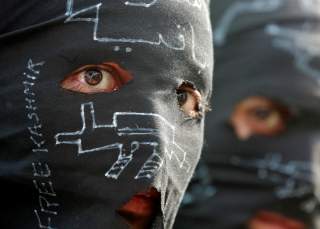India and Pakistan Are Headed Towards a Crisis over Kashmir
More and more Kashmiri on both sides of the Line of Control will come to see that they have been left with no option but the path of violence.
But Wells’s own statements on Kashmiri Muslims are hollow. She has called for the release of prisoners, but she knows they will not be released any time soon. Her overeager championing of the U.S.-Modi relationship at this time makes clear that she sees India, even a Hindutva India, as a vital bulwark against a rising China.
The situation in Kashmir is a slow-motion human rights and geostrategic crisis that requires the intervention of the United States and other world powers. But Modi’s power thrust in Kashmir is only part of a broader Hindutva agenda aimed at rendering Muslims in territory under Indian control into second-class citizens. The indifference of successive American administrations has enabled Hindutva extremists to consolidate power in India and push forward a radical agenda without consequence.
Just this week, Modi’s consigliere, Amit Shah, proclaimed that India would evict only Muslims deemed to be illegal immigrants and not Hindus and people of other faiths of the same status. India will face difficulty in sending these Muslims to neighboring Bangladesh. Instead, it is likely to house hundreds of thousands of Muslims in detention camps indefinitely and rendered them stateless. This would be just one step in a broader Hindu nationalist campaign to disenfranchise Muslim voters, a constituency least likely to vote for them, and remain in power for the long-term. Shah, after all, proclaimed last year that his party will rule for fifty years.
While Modi’s Bharatiya Janata Party or BJP’s handling of the economy has been poor, it remains deeply popular in large part due to the radicalization of the country’s Hindu majority. One major sign of that radicalization is that the country’s most popular state ruler is Yogi Adityanath, a Hindu priest who founded an anti-Muslim vigilante organization. Adityanath’s performance as chief minister of the Uttar Pradesh state has been poor, but his fusion of Hindu pietism and muscular Hindu nationalism appeals to the Hindu middle class.
What is happening in Kashmir is only one part of India’s broader transformation toward becoming a “Hindu rashtra” (Hindu nation) and hegemon in South Asia. Indian officials today are now muddying India’s supposed no-first use nuclear policy. They are making aggressive statements about seizing Pakistan’s Azad Jammu and Kashmir and Gilgit-Baltistan regions. And they are rewriting their own history based on Hindu mythology and nationalism, not objective scholarship. New Delhi is a revisionist state in more ways than one. And it is the Muslims of India, Pakistan, and Kashmir who will bear the consequences of Hindu triumphalism.
Washington and other world powers must press New Delhi to roll back its siege of Kashmir, release imprisoned politicians and civilians, and resume dialogue with Pakistan and a broad spectrum of Kashmiri leaders on the region’s future. The world community must demonstrate to the Kashmiris that their aspirations and grievances can be addressed through diplomatic and political processes. And Western powers that speak of democracy, human rights, and religious freedom, must take a firm stand against the Hindutva extremism that is transforming India, a nation of 1.3 billion people, before it is too late.
Arif Rafiq (@arifcrafiq) is president of Vizier Consulting, LLC, a political risk advisory company focused on the Middle East and South Asia.
Image: Reuters

